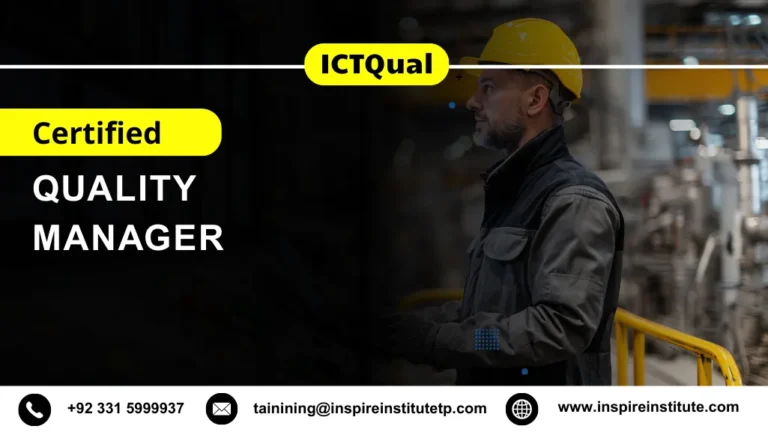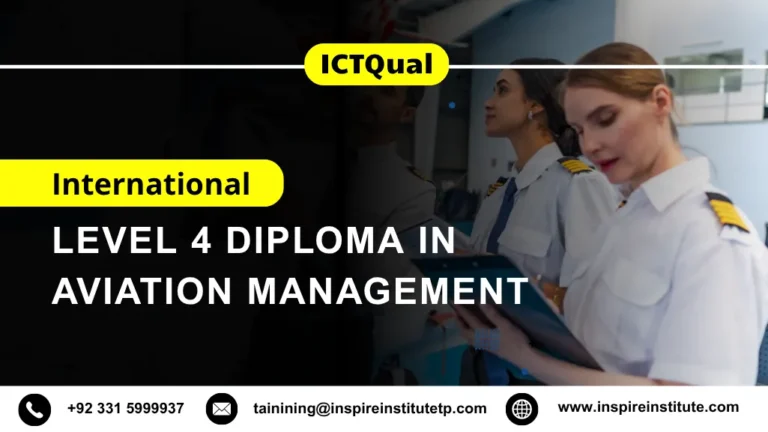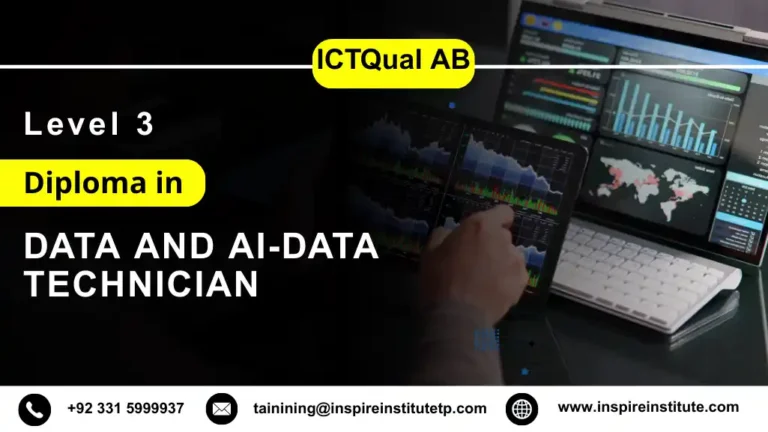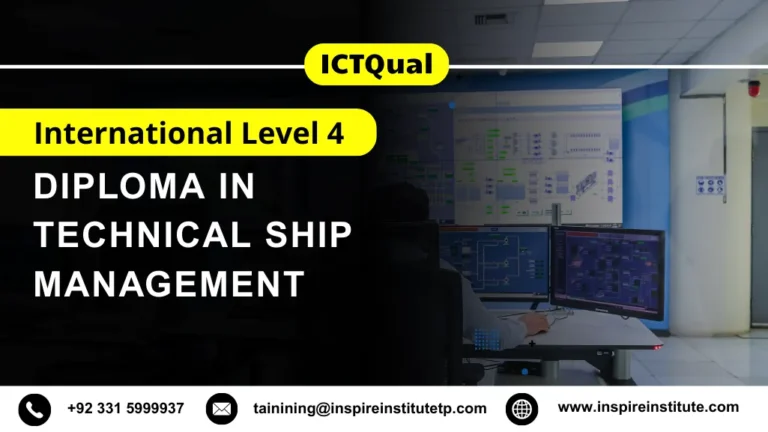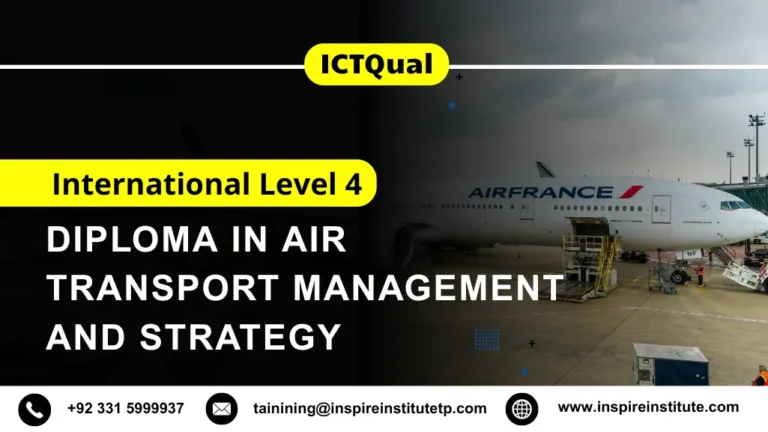ICTQual AB Level 6 International Diploma in Aerospace and Aviation Engineering
The ICTQual AB Level 6 International Diploma in Aerospace and Aviation Engineering is a globally recognized qualification designed for learners who want to build a strong career in the aerospace and aviation industries. This advanced programme provides in-depth knowledge, technical expertise, and practical skills required to work in one of the most innovative and fast-growing engineering fields.
The course covers a wide range of subjects within both aerospace engineering and aviation engineering, ensuring that learners gain a complete understanding of aircraft systems, aerodynamics, propulsion, navigation, and aviation safety standards. It combines academic learning with hands-on experience, preparing graduates to meet the technical and operational demands of the global aerospace and aviation sectors.
Learners enrolling in this Level 6 Diploma in Aerospace Engineering or Level 6 Diploma in Aviation Engineering will benefit from a curriculum that integrates theory with real-world applications. By working on technical projects, case studies, and industry-relevant assignments, students gain practical exposure to engineering challenges faced in modern aviation and aerospace industries.
This International Diploma in Aerospace Engineering is equally valuable for those aiming to specialize in aircraft design, maintenance, or aviation operations, as well as for learners interested in space systems and aerospace technology. Similarly, the International Diploma in Aviation Engineering opens doors to career opportunities in airline engineering departments, maintenance organizations, and aviation regulatory authorities.
One of the major strengths of this qualification is its global relevance. The ICTQual AB Aerospace Diploma and ICTQual AB Aviation Diploma are recognized internationally, enabling graduates to pursue career opportunities across airlines, aerospace manufacturers, aviation service providers, and research institutions.
By completing the Advanced Diploma in Aerospace and Aviation Engineering, learners not only gain a professional edge but also create pathways to higher qualifications such as postgraduate studies or specialized certifications. This diploma is the ideal choice for individuals seeking to advance their knowledge, expand their skills, and secure a rewarding future in aerospace and aviation engineering.
Why Choose this Qualification
Choosing the right qualification is one of the most important steps for anyone aspiring to build a successful career in aerospace and aviation. The ICTQual AB Level 6 International Diploma in Aerospace and Aviation Engineering has been designed to meet the needs of learners and professionals seeking advanced technical knowledge, practical skills, and global recognition. This diploma provides a perfect balance of academic learning and real-world applications, ensuring graduates are ready to meet the challenges of modern aviation and aerospace industries.
1. Comprehensive Curriculum
- Covers both aerospace engineering and aviation engineering fields.
- Focuses on aircraft design, aerodynamics, propulsion, and navigation systems.
- Includes aviation safety, regulations, and compliance standards.
- Integrates theory with real-world engineering practices.
- Provides technical and operational insights into the aerospace industry.
- Ensures a balance of academic depth and industry relevance.
- Keeps learners updated with emerging aviation and aerospace technologies.
2. International Recognition
- Qualification is recognized globally across aerospace and aviation sectors.
- Accepted by airlines, aerospace manufacturers, and research institutions.
- Supports applications for international career opportunities.
- Enhances chances of working in leading aerospace hubs worldwide.
- Strengthens employability in both civil and defense aviation industries.
- Valid qualification for professional memberships in engineering bodies.
- Adds credibility to resumes when applying for global positions.
3. Career Advancement Opportunities
- Prepares learners for roles such as Aerospace Engineer, Aviation Engineer, or Maintenance Engineer.
- Opens opportunities in aircraft design and development.
- Career options in aviation safety and regulatory organizations.
- Roles in aviation maintenance and repair organizations (MROs).
- Opportunities in airlines, airports, and aviation service providers.
- Growth into management positions within engineering departments.
- Pathway to become a consultant in aerospace or aviation projects.
4. Pathways to Higher Education
- Provides entry into Level 7 Diplomas in Aerospace or Aviation Engineering.
- Eligibility to apply for Master’s programmes (MSc) in Aerospace or Aviation fields.
- Acts as a foundation for doctoral research (PhD) in engineering.
- Opportunity to specialize in aviation management or aerospace technologies.
- Supports progression into professional certifications.
- Bridges academic learning with industry-based research projects.
- Enhances readiness for teaching and training roles in engineering education.
5. Flexible Learning Routes
- Designed for both fresh learners and experienced professionals.
- Offers a structured three-year route for new learners.
- Recognition of Prior Learning (RPL) route for experienced professionals.
- Combines classroom study, practical training, and online learning.
- Flexible assessments through assignments, case studies, and projects.
- Allows learners to study while continuing with professional work.
- Suitable for global learners through ICTQual AB approved centres.
6. Practical and Industry-Relevant Training
- Emphasizes hands-on learning through projects and workshops.
- Focuses on technical reports, case studies, and engineering analysis.
- Exposure to industry-relevant simulations and practical assessments.
- Prepares learners for real-world aerospace engineering challenges.
- Builds skills in problem-solving, analysis, and critical thinking.
- Encourages innovation and creative solutions in engineering tasks.
- Helps graduates develop practical competence alongside theory.
7. Long-Term Career Security
- High demand for aerospace and aviation engineers worldwide.
- Opportunities across civil, defense, and commercial aviation sectors.
- Continuous need for aircraft maintenance, safety, and design experts.
- Potential for career growth in sustainable aviation and green technologies.
- Industry resilience ensures long-term job stability.
- Recognized diploma supports global career mobility.
- Future-proof qualification aligned with aviation and aerospace trends.
Course Overview
UK based Qualification
Study Units: 36 Units
Evidence & Assignment Based
Course Level: Level 6
Qualification Structure
This qualification, the ICTQual AB Level 6 International Diploma in Aerospace and Aviation Engineering, consists of 36 mandatory units.
Year 1 – Foundation in Aerospace and Aviation Engineering
- Principles of Aerospace and Aviation Engineering
- Engineering Mathematics
- Fundamentals of Mechanical and Electrical Engineering
- Materials Science and Engineering
- Engineering Drawing and Computer-Aided Design (CAD)
- Introduction to Aerodynamics and Flight Mechanics
- Basics of Propulsion Systems
- Aircraft Structures – Fundamentals
- Avionics and Electrical Systems – Basics
- Health, Safety, and Environmental Practices in Aviation
- Communication and Technical Report Writing
- Introduction to Project Management in Engineering
Year 2 – Intermediate Studies in Aerospace and Aviation Engineering
- Aerodynamics and Fluid Dynamics – Applications
- Propulsion Systems and Gas Turbine Engines
- Aircraft Structural Analysis and Design
- Avionics and Navigation Systems
- Flight Mechanics and Performance Analysis
- Aerospace Materials and Manufacturing Processes
- Aircraft Maintenance and Reliability Engineering
- Systems Engineering in Aerospace Projects
- Unmanned Aerial Vehicles (UAV) – Fundamentals
- Sustainable Aviation and Green Technologies
- Applied Research Methods in Aerospace Engineering
- Project Planning and Aviation Operations Management
Year 3 – Advanced Studies in Aerospace and Aviation Engineering
- Advanced Aerodynamics and Computational Fluid Dynamics (CFD)
- Advanced Propulsion and Rocket Systems
- Advanced Structural Analysis and Composite Materials
- Flight Control Systems and Automation
- Space Systems Engineering and Satellite Technology
- Robotics and Autonomous Systems in Aviation
- Smart Aviation Technologies and Industry 4.0
- Aviation Safety, Risk, and Quality Management
- Cyber-Physical Systems and IoT in Aerospace Engineering
- Professional Ethics and Sustainability in Aerospace Engineering
- Innovation, Entrepreneurship, and Aviation Business Development
- Final Year Major Project (Capstone Project)
Who Should Take This Course
The ICTQual AB Level 6 International Diploma in Aerospace & Aviation Engineering is a professional qualification designed for learners and professionals who want to succeed in the aerospace and aviation sectors. It provides both technical knowledge and practical skills, making it suitable for a wide range of candidates including students, working professionals, and career changers. The program offers international recognition, career flexibility, and a strong foundation in engineering principles, ensuring learners are prepared for industry challenges and future opportunities.
1. Aspiring Aerospace Engineers
- Students who wish to start a career in aerospace engineering
- Individuals eager to explore aircraft design, aerodynamics, and propulsion
- Learners aiming to work with leading aviation manufacturers
- Those interested in innovative aerospace technologies
- Fresh graduates seeking international recognition in engineering
- Learners who want to develop both technical and academic competence
- Anyone looking for a solid foundation in aerospace and aviation engineering
2. Aviation Professionals Seeking Career Growth
- Employees currently working in airlines or aviation organizations
- Aviation technicians aiming to progress into engineering roles
- Professionals interested in aviation safety, compliance, and maintenance
- Individuals who want to step into supervisory or managerial roles
- Engineers planning to expand into the aerospace sector
- Aviation staff looking for an internationally recognized qualification
- Professionals preparing to work in global aviation hubs
3. Career Changers and New Entrants
- Individuals from unrelated fields seeking entry into aviation or aerospace
- People looking for a long-term career with strong global demand
- Learners motivated to contribute to aviation and aerospace innovation
- Professionals wishing to transition into engineering or technical positions
- Career changers searching for structured training and certification
- Candidates with a passion for aircraft and aviation technology
- New entrants aiming to establish themselves with a recognized diploma
4. Experienced Engineers and Technicians
- Engineers already working in related technical fields
- Technicians with hands-on experience in aviation maintenance
- Professionals who want to validate skills through formal certification
- Workers seeking career progression into advanced aerospace roles
- Experienced staff considering Recognition of Prior Learning (RPL) routes
- Engineers aiming to broaden their expertise across aerospace disciplines
- Professionals wanting to stay updated with modern industry standards
5. International Students and Global Learners
- Students who want to study at ICTQual AB approved centres worldwide
- Learners seeking globally recognized aerospace and aviation qualifications
- Individuals aiming to pursue international career opportunities
- Students preparing for higher education abroad in aviation or aerospace
- Candidates interested in flexible study routes and blended learning
- International learners wanting to enter global aviation industries
- Anyone who wants to stand out in international job markets
6. Future Leaders and Innovators in Aviation
- Learners aiming to lead projects in aerospace technology
- Candidates aspiring to management and leadership roles
- Innovators focused on sustainable aviation and new technologies
- Learners motivated to solve engineering challenges of the future
- Students who want to advance aircraft design and safety standards
- Learners aiming to combine engineering skills with leadership abilities
- Future professionals determined to shape global aviation practices
7. Learners Seeking Higher Education Pathways
- Students planning to progress to a Level 7 Diploma in aerospace or aviation
- Candidates interested in pursuing a master’s degree in aerospace engineering
- Learners preparing for doctoral-level research in engineering fields
- Students aiming to specialize in aviation management or aerospace systems
- Individuals pursuing professional membership in engineering associations
- Learners looking for a diploma that leads to advanced academic pathways
- Students dedicated to continuous learning and professional development
Certification Route
The ICTQual AB Level 6 International Diploma in Aerospace & Aviation Engineering is designed to accommodate both fresh learners and experienced professionals. This flexible certificate route ensures that candidates from different backgrounds can achieve internationally recognized qualifications in aerospace and aviation engineering. Whether you are just starting your journey in aircraft systems and aviation technology or already have extensive professional experience, this programme provides the right pathway for you.
Route for Candidates with No Experience
This pathway is designed for learners who are new to aerospace and aviation engineering and do not yet have professional experience.
- Admission: Learners enrol at an ICTQual AB approved centre to begin the three-year programme.
- Training: Complete all study units through classroom sessions, online modules, and practical learning.
- Assessment: Submit assignments, projects, technical reports, and case studies aligned with course outcomes.
- Certification: On successful completion, learners are awarded the ICTQual AB Level 6 International Diploma in Aerospace & Aviation Engineering, proving their readiness for the global aviation and aerospace industry.
Route for Experienced and Competent Candidates
This route is tailored for professionals who already have relevant experience in aerospace and aviation engineering or related fields.
- Eligibility: A minimum of 6 years of relevant work experience in aerospace, aviation maintenance, or related engineering sectors.
- Assessment of Competence: Centres review prior knowledge, skills, and industry achievements.
- Evidence Submission: Candidates provide documented proof of experience, such as job roles, portfolios, or project records.
- Knowledge and Understanding: Centres may conduct a skills gap analysis to confirm alignment with diploma requirements. Targeted learning may be assigned if gaps are identified.
- Certification: Upon successful verification, candidates may achieve the ICTQual AB Level 6 International Diploma in Aerospace & Aviation Engineering without completing the full training programme, recognising their prior learning and competence.
The certificate route of this Level 6 diploma provides flexibility for learners at all stages of their careers. Whether you are new to aerospace and aviation engineering or a seasoned professional seeking formal recognition, this qualification ensures you gain the skills, knowledge, and international recognition needed to advance in the global aviation and aerospace industry.
Eligibility Criteria
The ICTQual AB Level 6 International Diploma in Aerospace and Aviation Engineering is structured to ensure that learners are well-prepared to succeed in this advanced qualification. The entry requirements are designed to welcome both new learners and professionals, making this diploma accessible while maintaining academic and professional standards.
Minimum Age:Applicants must be at least 18 years of age at the time of enrollment. This ensures that learners have the maturity and readiness required to engage with the academic, technical, and practical components of aerospace and aviation engineering.
Educational Background: Learners are expected to have completed secondary education or an equivalent qualification. A strong background in science, mathematics, or engineering-related subjects is beneficial, as it helps learners understand the technical aspects of aerospace and aviation engineering covered in this Level 6 diploma.
Professional Experience:For fresh learners, no prior professional experience is required. However, candidates with relevant work experience in aerospace engineering, aviation maintenance, aircraft operations, or related engineering fields may also apply. Experienced candidates may be eligible for recognition of prior learning, which allows them to fast-track their progress through the diploma.
Language Proficiency: Since the qualification is delivered in English, applicants must demonstrate sufficient language proficiency. Learners should be able to read, write, and communicate effectively in English to successfully complete assignments, projects, and technical reports required in aerospace and aviation engineering studies.
Future Progression
Completing the ICTQual AB Level 6 International Diploma in Aerospace and Aviation Engineering opens up a wide range of career opportunities and academic pathways. Learners gain internationally recognized skills that prepare them for higher studies, specialized certifications, and professional roles across the global aerospace and aviation sectors. This qualification ensures that graduates are well-equipped to progress in their careers while contributing to advancements in aerospace technology and aviation operations.
Progression to Higher Academic Qualifications
- Opportunity to advance to a Level 7 Diploma in Aerospace Engineering or Aviation Management
- Eligibility to apply for master’s degrees in aerospace or aviation engineering worldwide
- Pathway to pursue postgraduate qualifications in mechanical or aeronautical engineering
- Ability to specialize in advanced subjects such as avionics or aerospace systems
- Preparation for doctoral research in aerospace or aviation-related fields
- Access to universities that value international professional diplomas
- Development of a strong foundation for continuous higher education
Career Opportunities in Aerospace Engineering
- Employment in aerospace manufacturing and design companies
- Roles in aircraft systems development and aerodynamics research
- Opportunities to work with defense and space agencies
- Positions in propulsion system design and engineering innovation
- Engineering careers focused on aircraft safety and performance testing
- Technical roles in advanced aerospace projects and research programs
- Global opportunities across aerospace hubs and international markets
Career Opportunities in Aviation Engineering
- Roles in airline maintenance and aircraft operations
- Employment with airport engineering and technical service providers
- Opportunities in aviation safety, compliance, and inspection departments
- Technical support roles for aviation equipment manufacturers
- Engineering positions within aircraft maintenance organizations (AMOs)
- Careers in aviation project planning and operations management
- International career opportunities in aviation hubs worldwide
Professional Recognition and Memberships
- Eligibility to apply for membership in professional engineering bodies
- Recognition by global institutions for aerospace and aviation qualifications
- Support in achieving chartered or licensed engineer status
- Access to professional networks in the aviation and aerospace industries
- Enhanced credibility when applying for technical or managerial roles
- Contribution toward professional development portfolios
- Recognition of prior learning and competence by employers worldwide
Opportunities in Research and Development
- Roles in research centers focused on aerospace innovation
- Opportunities to work on projects related to sustainable aviation technology
- Development of expertise in advanced aircraft and space systems
- Involvement in aviation research on safety and environmental impact
- Research pathways leading to publication and academic contributions
- Work with global institutions advancing aerospace technology
- Participation in collaborative international engineering projects
Pathways to Teaching and Training Roles
- Opportunities to work as trainers or instructors in aviation academies
- Teaching roles in technical and engineering institutes
- Ability to design and deliver specialized aerospace training programs
- Mentoring opportunities for new learners in aviation engineering
- Contribution to knowledge sharing in aerospace education
- Academic careers supported by further higher education studies
- Leadership roles in training organizations offering aviation diplomas
Long-Term Global Career Prospects
- Increased employability in both aerospace and aviation sectors
- Flexibility to work with international airlines and aerospace firms
- Ability to explore career opportunities in government and defense agencies
- Enhanced prospects in research, innovation, and project leadership
- Global recognition that supports career mobility across countries
- Preparation for leadership roles in aerospace and aviation industries
- Long-term stability in industries with continuous global demand
The ICTQual AB Level 6 International Diploma in Aerospace and Aviation Engineering provides a future-focused pathway, empowering learners to move confidently toward advanced studies, professional recognition, and rewarding global careers.


